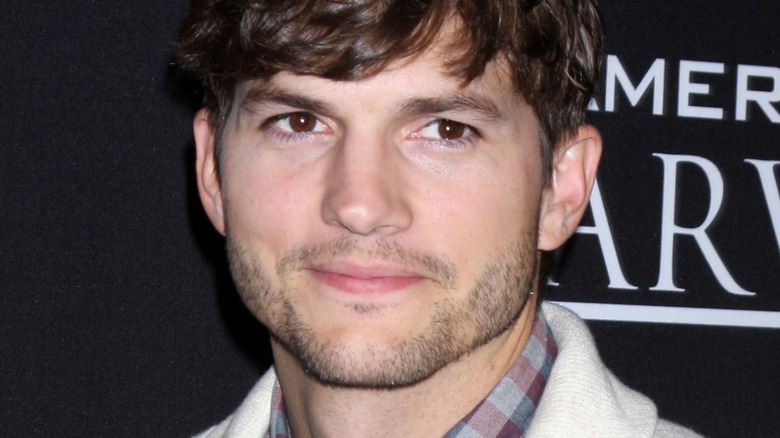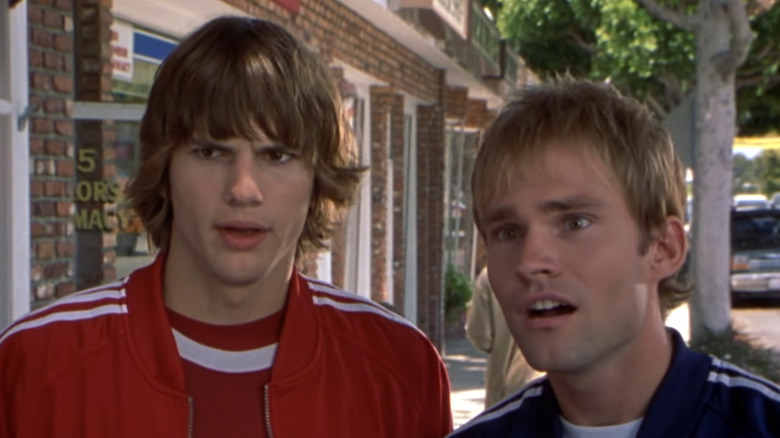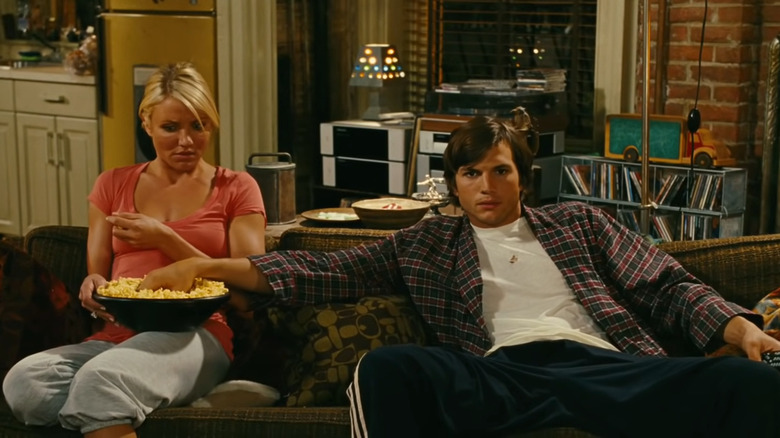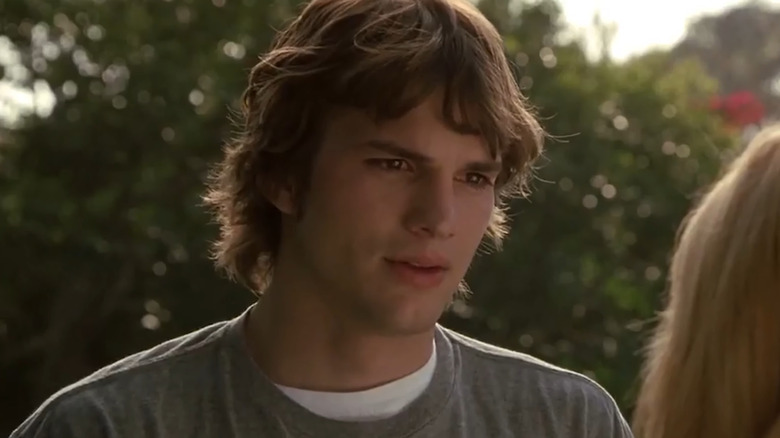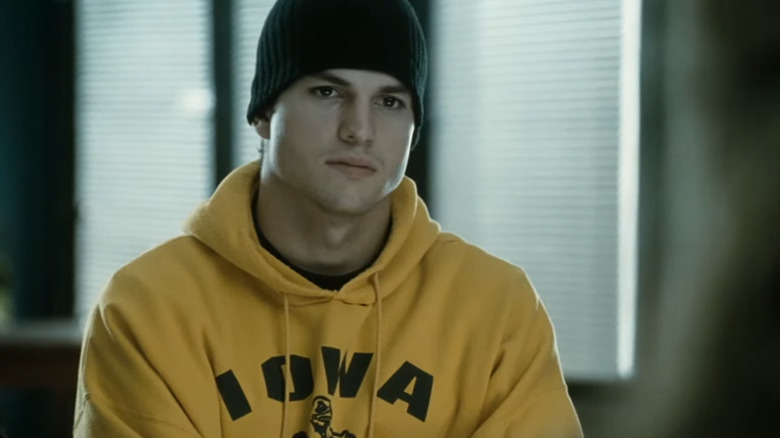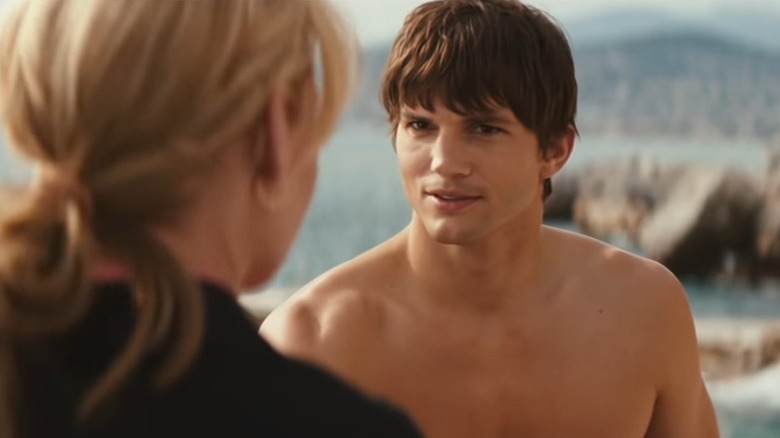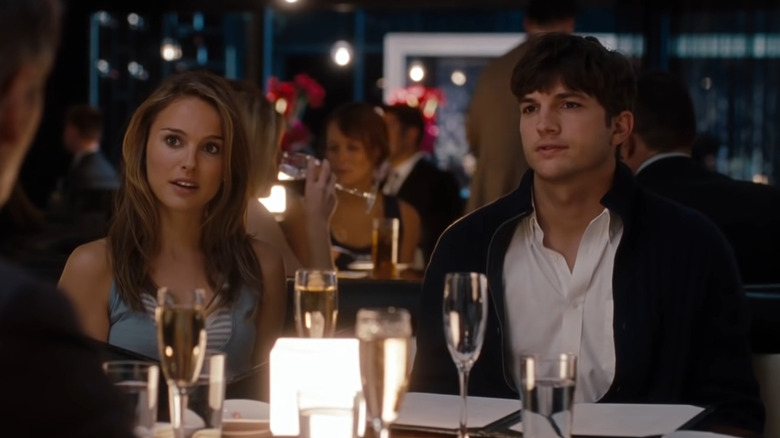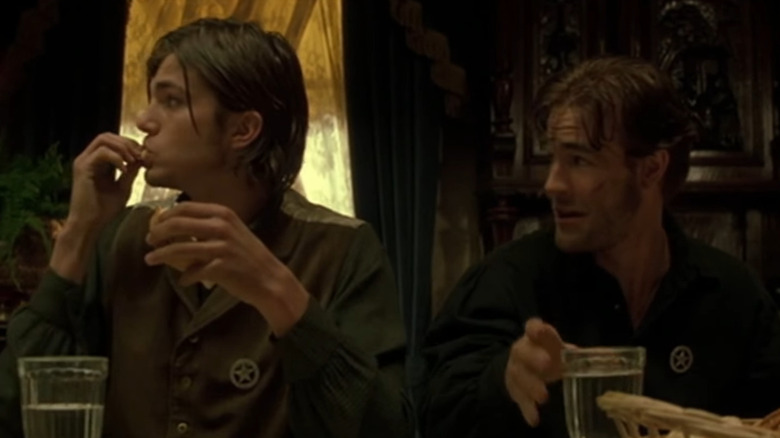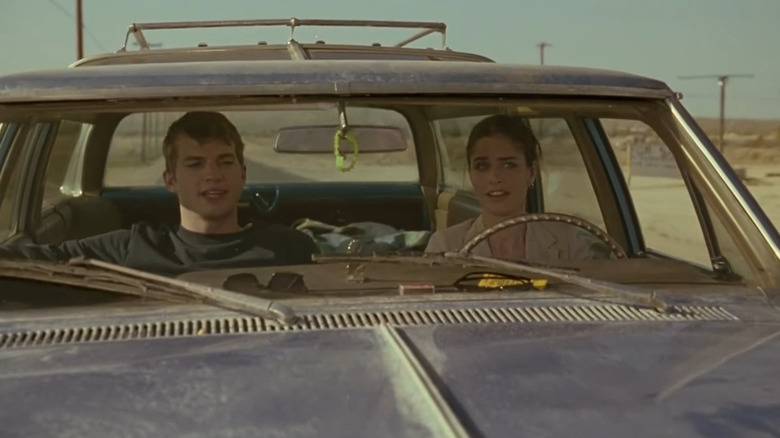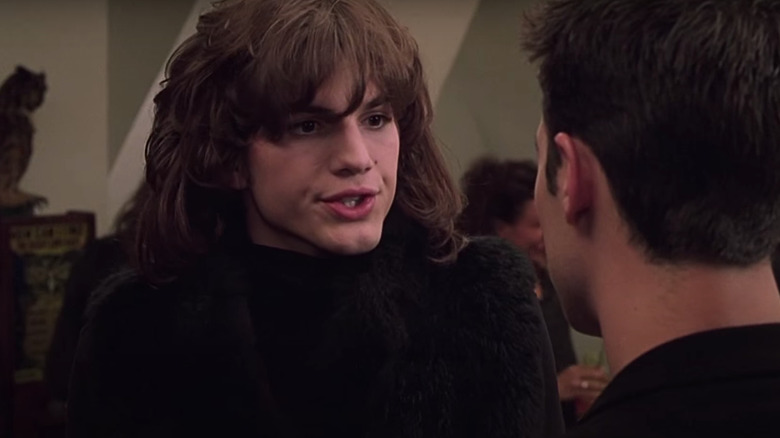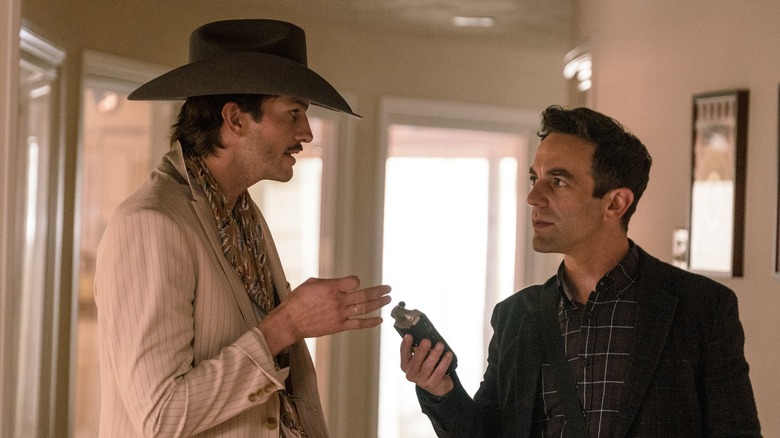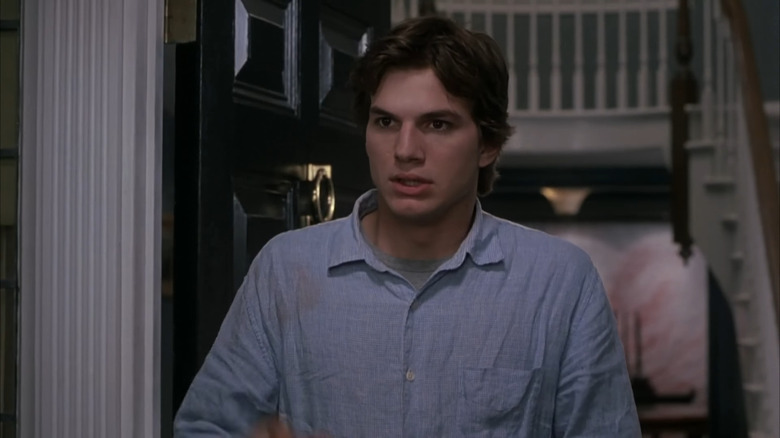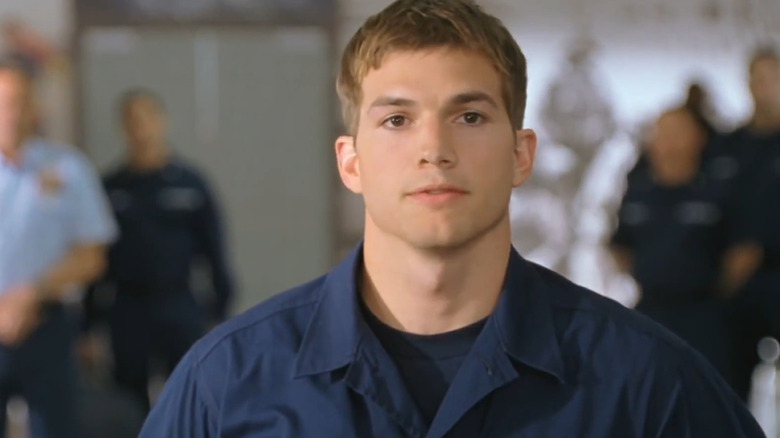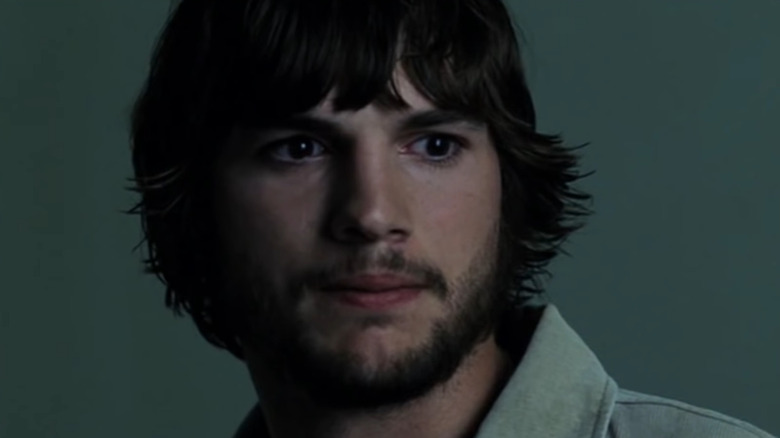Ashton Kutcher's 7 Best And 7 Worst Movies Ranked
Ashton Kutcher first entered the public spotlight as a model working for brands like Calvin Klein when he was 19 years old. His first acting gig was an immediate breakout role in "That '70s Show," a series that still remains one of his most popular projects. TV sitcoms have provided Kutcher with dependable success over the years, from his acting debut on the Fox show to leading roles later on including Netflix's "The Ranch" and as Charlie Sheen's replacement on "Two and a Half Men."
Kutcher's film work has been less consistent than his television career. With a couple of ups and a whole lot of downs, Kutcher's filmography is populated primarily with rom-coms of both the successful and the failed varieties. His best roles showcase his comedic timing and potential as a serious actor, while his worst parts might make you question why anyone in their right mind would ever cast him in the lead role in a movie. Based on the IMDb scores, these are Kutcher's seven best and seven worst movies.
Worst - Dude, Where's My Car?
After getting his start on "That '70s Show," Kutcher immediately made the leap into feature films. With a couple of supporting performances under his belt, Kutcher's first starring role was in "Dude, Where's My Car." This 2000 comedy pairs Kutcher with "American Pie" star Sean William Scott as Jesse and Chester, two low-IQ stoner roommates who attempt to find their car after a night of partying. The loose plot is little more than the barest excuse to string each comedic set piece together. Things get more and more ridiculous throughout, devolving into total nonsense as aliens and a special Rubik's Cube with the power to destroy the world are introduced.
"Dude, Where's My Car?" is an aggressively stupid comedy but, to be fair, that is exactly what it is going for. While many find the movie's sense of humor to be intolerable or even offensive, it did work decently for its target audience. Kutcher even earned multiple Teen Choice Awards nominations for the role, as well as a breakthrough male performance nomination at the 2001 MTV Movie Awards.
Best - What Happens in Vegas
If there is a single film genre most associated with Kutcher, it's rom-com. Unfortunately, many of the movies he has starred in haven't turned out too well, but "What Happens in Vegas" is a notable exception in some regards. With a plot that evokes a watered-down version of an old-school screwball comedy, the 2008 film follows a pair of strangers, Jack and Joy, who masquerade as a couple after getting married in Las Vegas while blackout drunk. They won a casino jackpot together, and keeping up their sham marriage is key to retaining the money, though the machinations for why that is the case aren't particularly believable.
Kutcher and Cameron Diaz play the couple at the center of the movie. Their chemistry and performances were points of contention amongst critics, with the duo even earning a Razzie nomination for worst screen couple, but general audiences were far more forgiving. The movie was a massive box office success and turned its $35 million budget into a $219 million box office return, making it one of the highest-grossing movies of the year worldwide. The star-studded supporting cast is a notable draw for the movie too, packed with names like Jason Sudeikis, Zack Galifianakis, Krysten Ritter, Rob Corddry, Lake Bell, Dennis Miller, and Queen Latifah. The movie also saw the debut of Billy Eichner, who would become a big name just a few years later and also make rom-com history.
Worst - Just Married
It's easy for "Just Married" to disappear into the sea of failed rom-coms for Kutcher. The straightforward plot brings him and Brittany Murphy together as a mismatched couple, Tom and Sarah, embarking on a honeymoon in Europe where things, of course, go awry in comedic fashion. Christian Kane plays the movie's main antagonist, Peter, a rich and jealous man who wants to break up the couple and win over Sarah.
Kutcher's popularity with younger viewers kept the movie from being a total commercial disaster even though it was trashed by critics. Kutcher and Murphy were each nominated for Teen Choice Awards and Razzies simultaneously. Their chemistry together should have at least been believable as the two began dating in real life shortly after the production wrapped, but any sparks between them couldn't save a terrible script, and many critics didn't buy their dynamic regardless. BBC film critic Stella Papamichael called the movie "juvenile" and "uncomfortable," and slammed the dynamic between the two leads, writing "Kutcher and Murphy are so far off the same page, the Amazon rainforest would need clearing to fill the space between. It's not chemistry that's lacking, simply that Murphy has no comic timing and Kutcher overcompensates."
Best - Personal Effects
The basic premise of "Personal Effects" sounds like it could fall into typical rom-com territory, but the story and tone are actually far darker than most of Kutcher's work. The core of the 2008-released film is a budding unorthodox romance between Walter (Kutcher), and an older woman, Linda (Michelle Pfieffer), but this is no rom-com. The two strangers are brought together through dire circumstances as they both have family members who have been brutally murdered. Their shared grief is what draws them together, and the potential for additional violence hangs over the film, preventing it from becoming a straightforward romance.
With a bit of added complexity, "Personal Effects" stands out from the other romance movies in Kutcher's career. The story is adapted from the short story "Mansion of the Hill" written by Rick Moody, with writer and director David Hollander penning the adapted screenplay. "Personal Effects" is Hollander's only feature film movie, though he has continued to enjoy a successful television career, leading shows like "Ray Donovan" and "American Gigolo." Though it is one of his better-received efforts, Kutcher's performance still drew criticism. In a TV Guide review, film critic Derek Armstrong was harsh on Kutcher, writing that his "attempt at playing serious falls flat. Kutcher's body language is stiff and self-conscious... much of the time he just looks like he's trying to do long division in his head."
Worst - Killers
Released in 2010, "Killers" is yet another in a long line of bad Ashton Kutcher-led romantic comedies. The X-factor to set it apart from the others is supposed to be the movie's action component, but that element doesn't impress either. Kutcher stars as Spencer, a world-class assassin who retires after falling in love with Jen (Katherine Heigl), a normal woman who is oblivious to his profession. It is no surprise that assassination isn't the easiest job to retire from, and the couple becomes the targets of other killers when a bounty is placed on Spencer's head. It is a rather cliché story with poor execution to match.
As had become typical for his career by this point, Kutcher was nominated for both the Teen Choice Award best actor and the Razzie for worst actor for this role simultaneously and, this time, he won both accolades. With an over-inflated budget that made it Lionsgate's most expensive movie at the time and a major advertising and PR push behind it, "Killers" was a box office dud, per Bomb Report. Time Out Magazine called the movie "just awful" and wrote that "With Katherine Heigl and Ashton Kutcher in the leads, charm is not an option."
Best - No Strings Attached
Released in 2011, "No Strings Attached" was Kutcher's last traditional rom-com to date (excluding the ensemble "New Year's Eve" released the same year), ending a long streak of movies in the genre on a positive note. The film pairs Kutcher with Natalie Portman as Adam and Emma, old acquaintances who begin a casual, no-romance sexual relationship. Of course, as a rom-com, real feelings eventually develop between the two. The movie was also released in the same year as "Friends with Benefits" starring Justin Timberlake and Mila Kunis, and the two films share the exact same premise. Kutcher and Kunis also became romantically involved the following year after earlier becoming friends on the set of "That '70s Show."
Though the plot is nothing special, there are two key strengths that help "No Strings Attached" stand out from the deluge of similar rom-coms. With Ivan Reitman in the director's chair ("Ghostbusters," "Twins"), "No Strings Attached" had a steadier hand behind the camera than most of Kutcher's prior movies. The film's other boon is the strength of the cast surrounding Kutcher. Not only is Natalie Portman a higher-caliber actor than many of his previous on-screen romantic partners, but the supporting cast is peppered with talents like Greta Gerwig, Kevin Kline, Mindy Kaling, Jake Johnson, Lake Bell, and Cary Elwes. With no Razzies in sight, Kutcher won the Teen Choice Award for "No Strings Attached" after a staggering 41 total nominations.
Worst - Texas Rangers
Made while he was still shooting "That '70s Show," "Texas Rangers" is one of Kutcher's first movie roles and also one of his worst. The 2001-released film is a Western set in the late 1800s following the end of the Civil War. Dylan McDermott leads a band of men through the reconstruction-era South to form what would end up becoming the titular Texas Rangers at the behest of the state's governor. Kutcher, as well as Usher and James Van Der Beek comprise his main deputies, while other notable names in the cast include Tom Skerritt, Robert Patrick, Rachel Leigh Cook, and Alfred Molina as the main villain, John King Fisher, a bloodthirsty gang leader who massacres innocent civilians.
The movie is mostly a true story and was adapted from the non-fiction book "Taming the Neuces Strip: The Story of McNelly's Rangers," written in part by the man Kutcher plays, George Durham, who actually served on this first team of Texas Rangers. "Texas Rangers" bombed just about as hard as a movie possibly can. With a $38 million budget, the movie grossed less than $1 million worldwide. The movie sits at an abysmal single-digit percentage on Rotten Tomatoes, while critics also universally panned it. Edward Guthmann of the San Francisco Chronicle wrote that the movie "plays as if the script pages had been tossed in the air and randomly assembled."
Best - A Lot Like Love
"A Lot Like Love" is one of Kutcher's first movies following his departure from "That '70s Show." This 2005 rom-com follows Oliver (Kutcher) and Emily (Amanda Peet), strangers who have a quick fling aboard an airplane, then part ways. Utilizing a protracted time frame, "A Lot Like Love" tracks the two as they continue to cross paths over the next several years, eventually developing a bond much closer than just a casual hookup.
Though it certainly doesn't break any new ground or redefine the genre, "A Lot Like Love" was well-received by its target audience and has remained Kutcher's highest-rated rom-com. The critical reception to the film was more mixed, but some took a liking to it all the same. BBC gave the film a slightly positive review and pointed to the two leads as its greatest strength, calling the movie "a great showcase for Kutcher and Peet's chemistry." Critic David Nusair echoed the sentiment, writing "there's plenty of chemistry between Peet and Kutcher, with the latter delivering an unexpectedly effective performance." Nusair was also impressed by the script, calling it "surprisingly mature and unpredictable."
Worst - Down to You
"Down to You" is a rom-com from the year 2000, but this time Kutcher is playing second fiddle as a member of the supporting cast. The main romantic coupling is between Imogen and Al, played by Julia Stiles and Freddie Prinze Jr., with the latter getting dumped and doing everything possible to win Imogen back. The plot is extremely simplistic and has nothing to offer that hasn't already been run into the ground by earlier rom-coms. "Down To You" is written and directed by Kris Isacsson, his feature-film debut, and he has not made a theatrical film since.
Kutcher plays a supporting role as a musician named Jim Morrison. Not the Jim Morrison of The Doors, but a wannabe who models his life on the famous singer. Joining Kutcher in the supporting cast are other big names like Henry Winkler, Rosario Dawson, and Selma Blair, but none of them are able to salvage a non-starter screenplay. Entertainment Weekly critic Owen Gleiberman slammed the movie and called it "the dreckiest of teen puppy courtships."
Best – Vengeance
Kutcher's performance in this 2022 movie is his best in quite a long time. "Vengeance" is a dark comedy thriller hybrid starring B.J. Novak ("The Office") as Ben, a New York City journalist who travels to small-town Texas for the funeral of a woman, Abilene (Lio Tipton), who he barely knows. While there, he puts his investigative journalism skills to use and attempts to unravel the truth behind her death, which some believe to be murder despite the official cause being ruled as an accidental drug overdose. Kutcher plays the mysterious local record producer Quentin Sellers who knew Abilene. Also on the supporting cast are Boyd Holbrook, Dove Cameron, Issa Rae, and musician John Mayer playing himself.
Novak also executive produced, wrote, and directed "Vengeance." Though he had earlier directed and written several episodes of TV shows he acted on, like "The Office" and "The Mindy Project," "Vengeance" is his directorial feature film debut. The Times critic Kevin Maher called the movie a clever reinvention of the murder-mystery genre, and critic Jim Laczkowski singled out Kutcher's performance on his Director's Club podcast, praising the "sublime performance... that deserves attention."
Worst - My Boss's Daughter
"My Boss's Daughter" was the first movie that Kutcher produced in addition to starring in, which might have been a bad call. This 2003 rom-com sees Kutcher playing a young businessman Tom, housesitting for his boss, Jack (Terence Stamp), while navigating his romantic feelings toward the titular boss's daughter, Lisa (Tara Reid). The supporting cast features an extremely eclectic mix of actors including Jeffrey Tambor, Molly Shannon, Dave Foley, Kenan Thompson, Carmen Electra, David Koechner, Tyler Labine, Michael Madsen, and Andy Richter.
This film is directed by David Zucker, who is one half of the duo who had earlier made great comedies like "Airplane!" and "The Naked Gun." Unfortunately, "My Boss's Daughter" shows none of the comedic qualities that made previous Zucker Brothers movies shine. Reviews were brutal across the board with many critics calling it exceptionally and bafflingly bad. Common Sense Media gave the film one-star and called it "crude, offensive, and all-around bad," while The AV Club dismissed it as "an abysmal screwball comedy that relies heavily on idiocy from both sides of the screen."
Best - The Guardian
"The Guardian" is an action drama that aims to glamorize the U.S. Coast Guard. Kutcher stars as Jake Fischer, a new recruit to the Coast Guard making his way through the training school, and his tough teacher, Ben Randall (Kevin Costner), respectively. Randall is traumatized by the deaths of his former crewmates and dealing with a marriage ending in divorce, while Fischer has an overinflated ego owing to his title as a swim-meet champion. When the two are brought together, sparks fly and they butt heads but eventually form a mentor-mentee relationship.
Released in 2006, "The Guardian" was the final feature film directed by Andrew Davis, who had earlier made the Academy Award-winning 1993 film, "The Fugitive." Critics were divided on the film, but general audiences took a strong liking to it. The New York Times was one particular outlet that gave the film a slightly positive review. Critic A.O. Scott was also optimistic about the future of the actor's career, writing that "Mr. Kutcher has a sly star quality."
Worst - Brother's Justice
Kutcher's lowest-rated movie on IMDb is 2010's "Brother's Justice." The film plays out as a mockumentary about the making of a fake action movie. Dax Shepard writes, co-directs, and stars in the lead role as himself. Kutcher also plays a fictionalized version of himself, with Shepard trying to convince him to co-star with him in this fake project. Most of the cast play versions of themselves as well, with Shepard calling in some famous friends to fill various acting and behind-the-scenes roles, including Jon Favreau, Tom Arnold, Seth Green, Bradley Cooper, and David Koechner.
Shepard and Kutcher have a lot of history together and have been close friends since working together on the '00s MTV prank show, "Punk'd." The best thing that can be said of "Brother's Justice" is that it seems like the people involved had fun while making it. It feels like a bunch of famous people goofing around on camera without much thought paid to make a compelling or cohesive movie.
Unfortunately, any fun the cast had on set does not carry over to the audience, and the movie is wholly unfunny — the 0% Rotten Tomatoes score really drives that point home. The Village Voice critic Aaron Hillis summed up this unscripted mockumentary as "an overlong episode of 'Curb Your Enthusiasm' with none of the wit and twice the irritation."
Best - The Butterfly Effect
Ashton Kutcher's best movie by a significant margin, according to IMDb users, is "The Butterfly Effect," and it is his only movie to score above seven stars out of ten. This 2004 thriller with a sci-fi and fantasy component revolves around time travel and the titular butterfly effect that comes with it — the ramifications in the present for changes made in the past. Kutcher stars as Evan, a man who has suffered from blackouts his entire life and learns that he can travel back in time to those moments and change them by reading from his journals.
The tone is far darker than Kutcher's other movies as it deals with subjects like child abuse, animal cruelty, self-harm, and pedophilia. "The Butterfly Effect" suffers from a few plot holes if you spend too long thinking about it and the internal logic of the time travel isn't entirely consistent, but, for the most part, the film succeeds in telling an engaging and somewhat disturbing story. The success of the film spawned two sequels in 2006 and 2009 respectively but they bear little connection to the 2004 movie. Kutcher did not return for either sequel, and they both followed different characters, made by different writers and directors.
